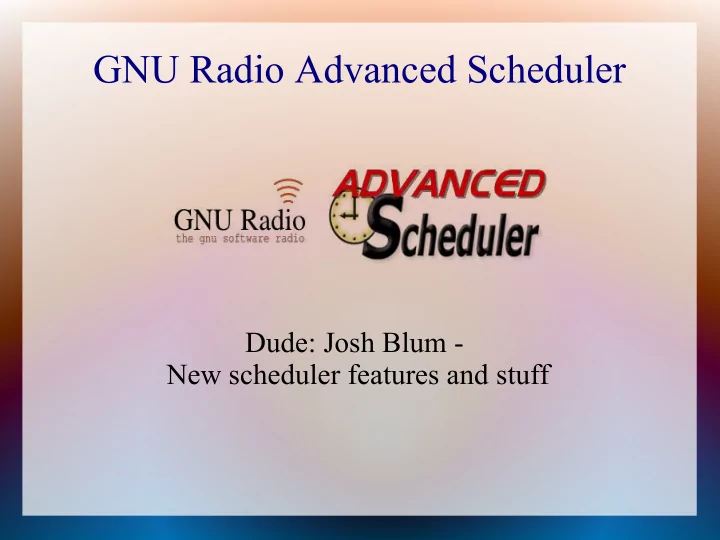

GNU Radio Advanced Scheduler Dude: Josh Blum - New scheduler features and stuff
GRAS - Project Goals ● Inherent thread safety – actor model ● New buffer model ● Zero copy support – In place buffers – Custom allocators ● Hooks for CPU/Node affinity ● Things that got fixed for free!
GRAS- Thread safety and the actor model ● Thread pool services ac- tors ● Each actor is synchronous ● Messages in/replies to sender ● Messages to arbitrary ac- tors https://en.wikipedia.org/wiki/Actor_model
GRAS - Theron library ● C++ implementation of the actor model ● Fast, lots of benchmarks ● Hooks for affinity ● Multiple thread pools ● Result: I don't have to think about thread synchronization mechanisms http://www.theron-library.com/
GRAS – Current buffer model Doubly mapped/circular buffer Reader 1 Writer Reader 0 ● Pros – very strait forward implementation – Simple back-pressure model – Edge cases are very simple ● Cons – cant do “smarter” things w/ memory – Buffer is glued to an output port – Cant in-place or choose arbitrary memory
GRAS – Message based buffer model Sink Port 0 B Source Port B Sink Port 1 ● New model means new possibilities ● Blocks pass reference counted buffers ● Pros – arbitrary buffer – Custom allocation – zero copy – Output buffer can be input - inplace ● Cons – complicates history and input reqs – Small memcpys
GRAS – Dealing w/ history Buffer 0 Buffer 1 Z + Buff0 Buffer 0 Buff0 + Buff1 Buffer 1 ● Memcpy to meet history requirements – sux ● History reqs << buffer size (memcpys are small) ● Needs benchmarking
GRAS – Affinity Hooks Node 0 Node 1 CPU CPU CPU CPU Hyper transport CPU CPU CPU CPU DDR Memory DDR Memory ● Memory bandwidth penalties for jumping nodes ● Flow graph topology based node association ● Or multiple flow graphs, 1 per node... etc
GRAS – Things that got fixed ● Dynamic reconfiguration of flowgraph – Just change the topology and commit ● Hierarchical block fixes – connect to self to self - By bye kludge copy – Don't need gnuradio::get_initial_sptr for hiers!
GRAS – Whats Done ● GNU Radio basically working – QA tests ● In-place buffers ● Custom input and output allocators ● Dynamic reconfiguration
GRAS - TODO ● All QA tests passing ● GR hooks for setting thread pool – Creating thread pool w/ set affinities ● GR Extras features – PMT message passing – do native, many to one – Python blocks support ● Follow and support Theron development ● Benchmark, benchmark, benchmark!
Recommend
More recommend